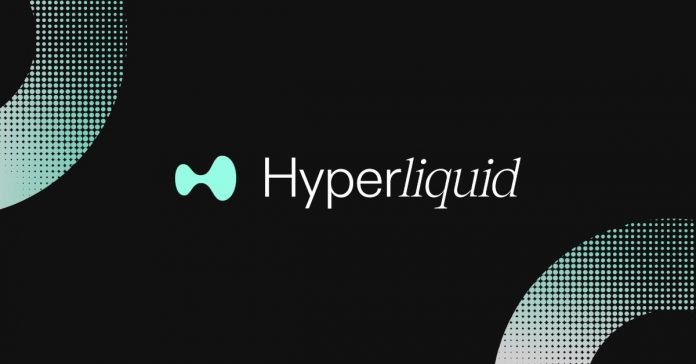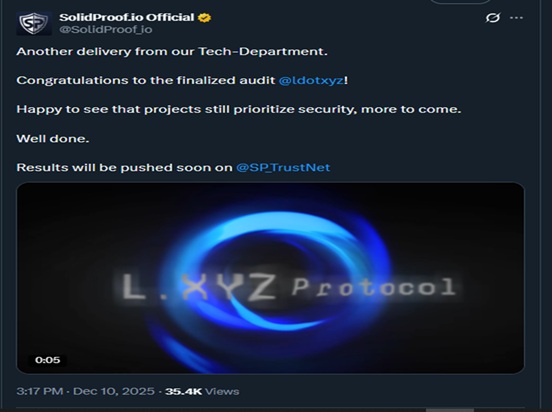As of mid-December 2025, EdgeX, a decentralized perpetual futures exchange incubated by Amber Group has flipped Hyperliquid in daily fee/revenue generation, according to multiple sources tracking on-chain data including DeFiLlama.
Recent posts and reports from December 14, 2025, highlight EdgeX taking the top spot in 24-hour protocol revenue among perp DEXs. This marks a significant shift in the highly competitive on-chain derivatives space, where Hyperliquid has long dominated with $89.5M in monthly fees earlier in December.
EdgeX’s growth is attributed to deep liquidity, lower fees e.g., 0.015% maker / 0.038% taker, strong mobile experience, and real user activity without heavy incentives. Earlier in the month around December 9-10, both platforms were neck-and-neck at ~$1.8M in 24h fees, topping all blockchains.
This “flip” reflects rotating capital and intensifying competition among perp DEXs like EdgeX, Hyperliquid, Lighter, and Aster.
Hyperliquid Introduces Portfolio Margin
In response to growing competition, Hyperliquid announced and launched a major upgrade: portfolio margin functionality. Announced around December 11-12, 2025, and rolled out in pre-alpha on testnet shortly after.
Key features: Unifies spot and perpetual trading under a single balance for maximum capital efficiency. Allows spot holdings to offset perp positions like enabling carry trades with reduced liquidation risk via PnL offsets.
Unused borrowable assets automatically earn yield. Integrates with HyperEVM lending protocols. Initial testnet limits: Strict caps (e.g., < $1,000 recommended), only USDC borrowable and HYPE as collateral; more assets (USDH, BTC) planned before alpha/mainnet.
This is positioned as a game-changer for professional traders, similar to traditional finance portfolio margin systems that have historically boosted derivatives liquidity massively.
The timing aligns with EdgeX’s revenue surge, suggesting Hyperliquid is enhancing its product to retain dominance in trading volume, open interest, and long-term revenue. Both developments underscore the rapid evolution of on-chain perp trading in late 2025, with real fees/revenue not just volume as the key metric for sustainability.
Hyperliquid remains the overall leader in most categories, but EdgeX is closing the gap quickly. This flip highlights intensifying competition in a sector that has exploded in 2025, with cumulative perp volumes exceeding trillions and real fees becoming the key sustainability metric over inflated volume from incentives.
EdgeX’s edge comes from superior user experience— CEX-like mobile app, deep orderbooks, lower fees at ~0.038% taker/0.015% maker vs. Hyperliquid’s higher rates, organic growth without heavy points farming, and strong liquidity attraction.
Traders note it “feels product-first,” with real activity driving the surge. However, Hyperliquid still leads in monthly/annualized revenue ($89.5M in early December vs. EdgeX’s ~$61M), total volume, open interest, TVL ($4.5B), and active users. The 24h flip reflects capital rotation amid market volatility, not a permanent dethroning.
The perp DEX market is maturing into a multi-player race including Aster, Lighter. No single platform dominates indefinitely—traders chase best execution, fees, and liquidity, leading to rapid shifts.
Implications of Hyperliquid’s Portfolio Margin Introduction
Hyperliquid’s rollout of portfolio margin pre-alpha on testnet as of mid-December 2025 is a direct response to competitive pressure, including EdgeX’s revenue gains. Unifies spot and perp balances for cross-offsetting (e.g., spot BTC hedges perp shorts, reducing margin requirements and liquidation risk).
Enables advanced strategies like carry trades with PnL offsets. Unused assets auto-earn yield; integrates with lending protocols. In TradFi, similar systems added $7.2 trillion to derivatives liquidity by improving capital efficiency—a “substantial multiplier” for every new dollar inflow.
Boosts Hyperliquid’s stickiness for professional/high-volume traders, potentially reclaiming volume/share and sustaining long-term revenue dominance. Increases overall on-chain perp liquidity and efficiency, blurring lines with CEXs.
Early testnet limits < $1K recommended, limited assets mean gradual rollout; poor implementation could amplify systemic risks in volatile markets. Timing suggests defense against rivals—could accelerate adoption if mainnet launch succeeds, reinforcing Hyperliquid as the “infrastructure layer” for on-chain derivatives.
Lower fees, better UX, and features like portfolio margin/yield will attract more capital, pushing perp DEXs toward 10%+ of global derivatives market share. Real fees not incentive-pumped volume separate winners—Hyperliquid’s buybacks and EdgeX’s organic growth signal viable models.
Rotating platforms yields best rates/execution; expect more flips as products evolve. High leverage + efficiency could amplify liquidations in downturns; regulatory scrutiny (e.g., expanding CFTC oversight) looms for all.
EdgeX’s flip is a wake-up call showing challengers can close gaps quickly, but Hyperliquid’s portfolio margin positions it to widen its moat for capital-efficient trading. The 2025 perp wars are far from over—expect continued volatility in leaderboards.









